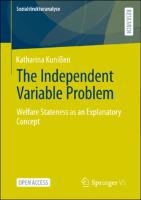The Independent Variable Problem
Welfare Stateness as an Explanatory Concept
Abstract
This open access publication deals with the operationalisation of the welfare state as an independent variable. To study how welfare states affect social inequality, individual behaviour, attitudes and more in different countries, an empirical operationalisation of the welfare state or specific elements of social policy is required. However, this operationalisation is fraught with some important problems. These problems essentially relate to one point: while there are a large number of contributions dealing with the measurement of differences between welfare states per se and as a dependent variable, there is a lack of feasible recommendations for a standardised operationalisation of welfare stateness as an independent variable. So far, there has been no systematic investigation of how such different approaches may affect the results and their comparability. Also missing is an in-depth conceptual discussion of which features of the welfare state are particularly relevant for explaining certain effects. This book fills both gaps. First, it exposes the pitfalls of existing approaches and shows how much empirical results can vary depending on the operationalisation chosen. Second, it proposes a framework for a standardised conceptualisation and operationalisation of social policies as independent variables that constrains operational decisions in a theoretically meaningful way.
Keywords
Welfare state; Social policy; Indicator; Multilevel analysisDOI
10.1007/978-3-658-39422-6ISBN
9783658394226, 9783658394226Publisher
Springer NaturePublisher website
https://www.springernature.com/gp/products/booksPublication date and place
Wiesbaden, 2023Imprint
Springer Fachmedien WiesbadenSeries
Sozialstrukturanalyse,Classification
Sociology
Public administration
Society and Social Sciences


 Download
Download Web Shop
Web Shop